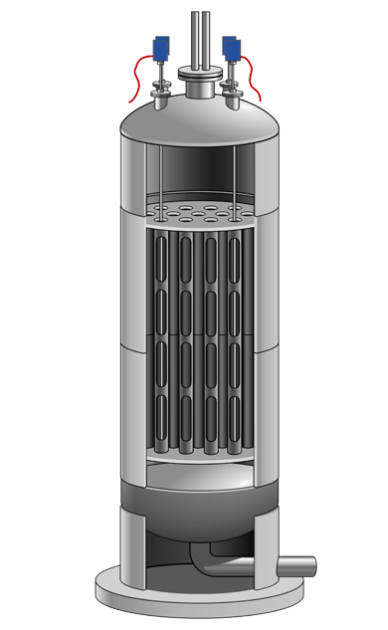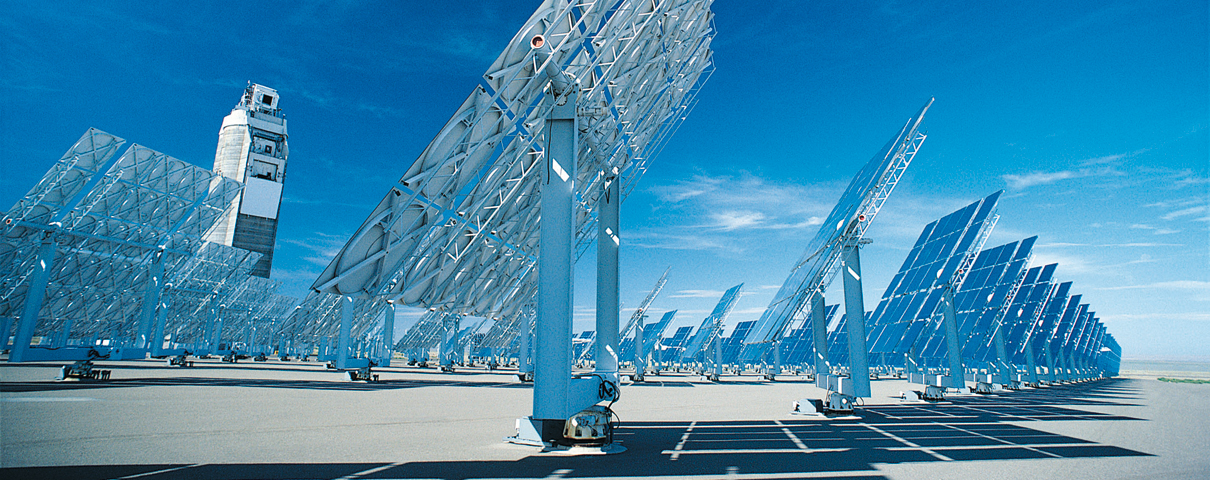
Waste is valuable. Solid municipal waste, such as packaging, paper or food, can be used to produce fuel for aircraft, for example. During the production process, the control of exothermic reactions requires reliable and precise temperature monitoring. This requires a multipoint thermocouple. A manufacturer of sustainable aviation fuel (SAF) uses the model TC97 from WIKA-Gayesco, a miniature sensor for tight installation situations, for this task.
The SAF producer uses plastic waste as a raw material for its fuel. It has it shredded in large quantities into feedstock. This is then decomposed in a gasification process and processed into a synthesis gas, or “syngas” for short. In contrast to combustion, this is a closed process that does not release any pollutants into the atmosphere.

A tubesheet reactor is used to produce crude oil substitute, which is later refined into sustainable aviation fuel. The cross-section of such a reactor with multipoint thermocouples for temperature monitoring shown here is not to scale.
A crude oil substitute is created from “syngas”
In the next production step, the “syngas” is converted into a crude oil substitute, the “syncrude”, in a tubesheet reactor using the Fischer-Tropsch process. This process takes place in tubes that contains a proprietary catalyst system. Each tube has a length of 18 metres.
Nine multipoint thermocouples are needed
Temperatures of up to +327 °C occur in the catalyst tubes. Precise knowledge of the temperature profile in the process is crucial for its efficient operation and, ultimately, for the desired product quality. The high temperatures are by no means the only challenge here. The catalyst tubes have a diameter of five centimetres, so the hole for the multipoint thermocouple is correspondingly small. Its diameter must be as small as possible so that the measuring instrument does not interfere with the reaction. In order to obtain a meaningful temperature profile of the processes in the reactor, nine tubes must be instrumented with a multipoint thermocouple.
Measuring task in the smallest of spaces
For this measuring task in the smallest of spaces, the temperature specialists at WIKA-Gayesco chose the TC97 miniature sensor, a proven multipoint thermocouple in exothermic, high-temperature and high-pressure tubesheet reactors. They manufactured nine instruments, each with 13 measuring points in an 18 metre long sensor sleeve with a diameter of just 4.7 millimetres.
Temperature profile for early detection of process-endangering hotspots
The individual sensors are positioned in such a way that together they record the process temperature over 39 predefined heights in the catalyst bed. Due to the high measurement quality and the short response time of the TC97, the SAF manufacturer receives a temperature profile that enables them to react quickly to developments in the process. They can detect the formation of harmful hot spots as a result of improper process behaviour at an early stage and evaluate the service life of the catalyst.
Multipoint thermocouples ensure a three-year operating cycle
The measuring instruments were installed under challenging conditions. Each multipoint thermocouple had to be guided through a series of tightly toleranced openings. Thanks to the resistant material of the sleeve jacket and with the help of a pull wire and a mounting mechanism, the installation went smoothly. The TC97s are designed to be robust in accordance with the application in order to guarantee a three-year operating cycle, in line with the intended service life of the catalyst. Their signals are transmitted to the DCS and SIS system via a flexible cable using 4 … 20 mA transmitters. The “syncrude” obtained in the Fischer-Tropsch reactor is then refined into the end product. Sustainable aviation fuel is free of sulphur, particulate matter and other contamination. Compared to a fossil-based fuel, it causes 80 percent less greenhouse gas emissions.
Note
Detailed information on the TC97 multipoint thermocouple sensor and other multipoints is available on the WIKA website. There we also provide an overview of other measurement solutions for the oil and gas industry. If you have any questions, your contact will gladly help you.
Also read our posts
CCUS is often the only option for decarbonisation
New Food: Biomass fermentation harbours complex measuring requirements
Plastics production: Safe pressure measurement up to 330 °C
Pressure measuring system against fugitive methane emissions

